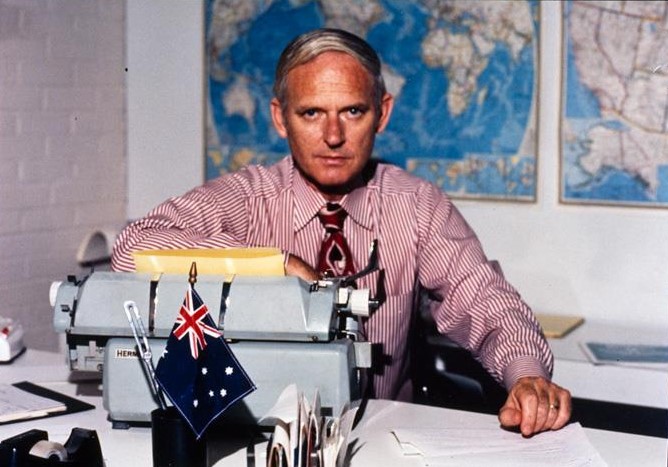
It’s long been a tantalising trope: the foreign correspondent as spy, now reprised by
Australian Financial Review journalist Aaron Patrick in his feature about a long-serving ABC journalist and senior executive, Peter Barnett, who died last month at the age of 90. Whether Barnett was a spy or eager interlocutor, in other than a journalistic sense, I have no idea.
But there’s merit in considering the man with reference to the ABC’s history as a component of Australia’s sovereign infrastructure—that is, how the broadcaster functioned as an instrument of the state’s discursive power in Asia and the Pacific, offering cultural representation with political purpose. It’s a function that is, in principle, compatible with the tenets of journalistic integrity.
Barnett joined the ABC in 1961, initially as a part-time journalist in Singapore, and spent most of the following two decades as a foreign correspondent. He established the ABC’s Washington bureau in 1967 and, in 1979, returned home to become the head of Radio Australia. As a young current-affairs producer, I dealt with Barnett in his capacity as Washington correspondent; later I had charge of news and current affairs during his tenure as director of Radio Australia.
Patrick suggests that when Barnett was overseas he may have provided information to—or been engaged by—the Australian Secret Intelligence Service, although he offers no convincing evidence. In any case, what foreign correspondent in the wild hasn’t traded information with diplomats or other agents of the state? I certainly did.
To some extent, the rumours about Barnett arose because his brother, Harvey, worked for ASIS and later became head of the domestic intelligence service, the Australian Security Intelligence Organisation. Peter won recognition and favour within the ABC not least because of his relationships with US presidents Lyndon Johnson and Jimmy Carter, and his success in arranging meetings with them for visiting ABC executives. But a fraternal relationship and a talent for schmoozing alone do not a spy make.
Of course, history is replete with examples of journalistic complicity. During the Spanish Civil War, personages such as Ernest Hemingway, George Orwell, Kim Philby and others deployed as reporters working for mainstream Western mastheads while serving other political masters or becoming combatants or conspiring to do all three at once. Perhaps history and mythology tend to excite headline writers, as in the case of the Patrick’s feature: ‘Was the ABC’s greatest foreign correspondent a spy?’
There’s a wider truth to be drawn here, with an eye to Australia’s contemporary outlook that is more strategically and ideologically complex than in the Cold War era that Barnett experienced. Whatever his affiliations, he was no more a culturally neutral actor than any journalist operating today. He joined the ABC in pre-independence Singapore just five years after it had been established as the national broadcaster’s first dedicated Asian news bureau.
Under Prime Minister Robert Menzies, in 1955, the Cold War Planning Committee of cabinet had advocated an expansion of the ABC’s and Radio Australia’s activities in Asia, including establishment of a presence in Singapore. This was within two years of the Korean War ceasefire, one year after the decisive battle of Dien Bien Phu, and when Indonesia’s communist party grew to be the largest outside of the Soviet Union and China. The ABC’s first Singapore representative, the future Australian Democrats senator Colin Mason, advised the chief executive that a proposed TV news syndication service could play a major role in countering communist propaganda in Southeast Asia.
Barnett’s affiliation with the ascetic and anti-communist Moral Rearmament Movement may well have suited the zeitgeist of post-war conservatism, just as the presence of his brother in the ASIS Singapore office, at the time, may have aided his entrée to the community of Australian expatriates. The fact remains that Barnett’s recruitment in Singapore rather than Australia—which Patrick observes to have been counter to ABC practice—occurred as the news bureau developed rapidly as a hub for Asian coverage. Expansion reflected at once the broadcaster’s broadening editorial outlook and the geopolitical interests of the state.
So too did the ABC’s associated activities. Radio Australia leveraged the audience appeal of its editorial independence and informality to model core strategic narratives, including those about freedom of speech, access to information and the post-war Western order, and to counter the reputational legacy of the White Australia doctrine. ABC training and technical assistance projects aimed to strengthen local media systems and promote an open marketplace of ideas.
In the immediate post–Cold War years, Barnett bemoaned the ABC’s undoubted
‘lack of vision and neglect’ of Radio Australia. His autobiography—
Foreign correspondence: a journalist’s biography—ignores his nine hard-going years as head of the international broadcasting division. My recollection of his work as a correspondent in Washington was of succinct news reportage, offered without nuance or deep analysis, notwithstanding his long experience and reputation as a canny networker. Would he have offered more insight as a spy for ASIS?
 Print This Post
Print This Post